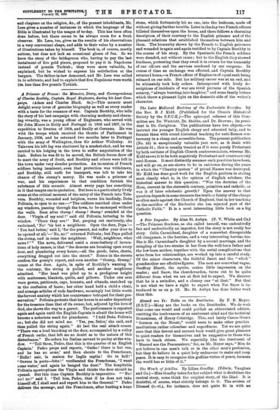A Prisoner of Prance: the Memoirs, Diary, and Correspondence of
Charles Boothby, Captain Royal Engineers, during his Last Cam- paign. (Adam and Charles Black. 6s.)—This memoir must delight every lover of genuine biography as well as every reader with a taste for the romance of war. Captain Boothby, who tells the story of his last campaign with charming modesty and charm- ing vivacity, was a young officer of Engineers, who served with Sir John Moore in Sicily and Portugal in 1806 and 1807, in the expedition to' Sweden of 1808, and finally at C,orunna. He was with the troops which received the thanks of Parliament in January, 1809, and he returned two months later to Portugal with the army of Wellington, then Sir Arthur Wellesley. At Talavera his left leg was shattered by a musket-shot, and he was carried to his lodging in the town to suffer amputation of the limb. Before he was fit to be moved, the British forces drew off to meet the army of Soult, and Boothby and others were left in the town under very slender protection. An incursion of French soldiers being imminent, even that protection was withdrawn, and Boothby, still unfit for transport, was left to take his chance of the enemy's mercy. He was made a prisoner of war, and his experiences in that condition furnish the substance of this memoir. Almost every page has something in it that tempts one to quotation. But here is a particularly lively scene at the critical moment of the entry of the French into Tala- vera. Boothby, wounded and helpless, warns his landlady, D0119. Pollonia, to open to no one :—" The soldiers marched close under my windows, passing through the town, to be encamped without the walls. Soon after thump ! thump ! thump! sounded at the door. Virgin of my soul !' said old Pollonia, tottering to the window. There they are ! ' But, peeping out cautiously, she exclaimed, No! 'tis but a neighbour. Open the door, Pepa.'—
You had better,' said I, for the present, not suffer your door to
be opened at No, no !' returned Pollonia; but Pepa pulled the string, and in came the neighbour. 'Well, neighbour, what news ? ' " The news, delivered amid a cross-battery of invoca- tions of holy names, is that "the demons are breaking open every door, and plundering every house,—all the goods, bales, chests, everything dragged out into the street." Noises in the streets confirm the gossip's report, and soon another "thump, thump,' comes at the door. Again, in spite of BootLby's warning to the contrary, the string is pulled, and another neighbour admitted. "Her head was piled up to a prodigious height with mattresses, blankets, quilts, and pillows. Under one arm were gowns, petticoats, caps, bonnets, and ribands, snatched up in the confusion of haste; her other hand held a child a chair, and strange articles of rude hardware, seemingly but little worth the fervent anxiety which her countenance betrayed for their pre- servation." Pollonia protests that her house is no safer depository for the treasure than that of its owner, but, adjured by the love of God, she shows the way to a garret. The performance is repeated again and again until the English Captain is afraid the house will become a notorious mark for plunderers. "I told Doiia Pollonia so; but she did not mind me. Yes, yes, Seitor,' she said, and then pulled the string again." At last the real attack comes. "There was a loud knocking at the door, accompanied by a volley of French oaths, that left me no doubt as to the nature of this disturbance." He orders his Italian servant to parley at the win- dow. "Tell them, Pedro, that this is the quarter of an English Captain.' Pedro peeps and reports, Gadso ! there is but one, and he has no arms,' and then shouts to the Frenchman, Hallo! stair, la maison for Inglis captin ! Go to hell !' Ouvrez la porte—bete!' vociferated the Frenchman, 'I want some water,' and again he banged the door." The hospitable Pollonia apostrophises the Virgin and thinks the door should be opened. But this time Captain Boothby is imperative. "No!
! no ! no !' said I. Tell him, Pedro, that if he does not take himself off, I shall send and report him to the General." Pedro delivers the meager., and the Frenchman, after hurling a huge
stone, which fortunately hit no one, into the bedroom, made off without giving further trouble. Later in the day two French officers billeted themselves upon the house, and there follows a charming description of their courtesy to the English prisoner and of the pleasant relations that established themselves between him and them. The humanity shown by the French to English prisoners and wounded is again and again testified to by Captain Boothby in the course of his story. By the Spaniards the French soldiers were dreaded, not without cause ; but to the English they showed kindness, protesting that they owed it in return for the humanity of our officers and the services rendered by our surgeons. In course of time an exchange was effected, and Captain Boothby returned home,—a French officer of Engineers of equal rank being released on our side. But his military career was at an end, and be ultimately took holy orders. Interspersed with lively de- scriptions of incidents of war are vivid pictures of the Spanish scenery, "always bursting into laughter," and some family letters which throw a pleasant light on the domestic side of the writer's character.


















































 Previous page
Previous page